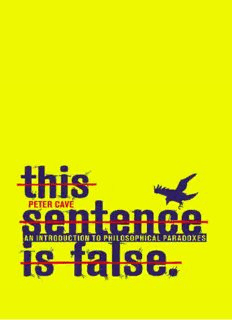Table Of ContentThis Sentence is False
AlsoavailablefromContinuum:
ABriefHistoryofPhilosophy,DerekJohnston
AtoZofPhilosophy,AlexanderMoseley
HowtoMakeGoodDecisionsandBeRightAlltheTime,IainKing
HowtoWinEveryArgument,MadsenPirie
PhilosophyforLife,RupertReadandM.A.Lavery
TheGood,theTrueandtheBeautiful,MichaelBoylan
ThisBookDoesNotExist,GaryHaydenandMichaelPicard
ThisBookHasIssues,ChristianJarrettandJoannaGinsburg
ThisIsNotaBook,MichaelPicard
TwentyGreatestPhilosophyBooks,JamesGarvey
WhatDon’tYouKnow?,MichaelC.LaBossier
WhyTruthMatters,JeremyStangroomandOpheliaBenson
This Sentence is False
An introduction to
philosophical paradoxes
Peter Cave
Continuum
TheTowerBuilding,11YorkRoad,LondonSE17NX
80MaidenLane,Suite704,NewYork,NY10038
www.continuumbooks.com
©PeterCave2009
Allrightsreserved.Nopartofthispublicationmaybereproducedor
transmitted,inanyformorbyanymeans,electronicormechanical,
includingphotocopying,recording,oranyinformationstorageorretrieval
system,withoutpriorpermissioninwritingfromthepublishers.
BritishLibraryCataloguing-in-PublicationData
AcataloguerecordforthisbookisavailablefromtheBritishLibrary.
ISBN:HB:978-1-8470-6219-2
PB:978-1-8470-6220-8
LibraryofCongressCataloging-in-PublicationData
AcatalogrecordforthisbookisavailablefromtheLibraryofCongress
TypesetbyKennethBurnley,Wirral,Cheshire
PrintedandboundinGreatBritainbytheMPGBooksGroup
Contents
Preface vii
Acknowledgements xi
1 Welcometotherationalirrational–howtowin,
howtostarve,andhowtopumpmoney 1
2 Toocleverbyone-half–or,atleast,one-eighth 18
3 Lather,rinse,repeat–‘repeat’didyousay? 34
4 Infinity:withoutend,withoutbeginning–yetwith
aflea,aflyandabandit 52
5 Heapsandhaze,coloursandclocks–and1,001cats 70
6 Ravens,lotteries,medicalmatters–andagruesometale
ortwo 91
7 Moralityandpolitics–blackmail,buck-passingand
voting 108
8 EncounterswithGod–andhismysteriousways 129
9 Encounterswithourmysteriousways–love,luckandlife 147
10 Whentostop 168
Appendix1:Furtherreading 193
Appendix2:Notes,sourcesandreferences 195
Appendix3:Paradoxespurveyed 202
Bibliography 205
GeneralIndex 211
ForAngelaJoyHarvey,
BlueS.,SilverS.,andparadoxicalliveseverywhere,
withinandwithout.
Preface
Letusbehuman.
WhenfirsttoldthattheEarthbothspinsandorbitstheSun,wemay
find it paradoxical. After all, it looks as if just the Sun does the
moving.Whenwelaterreflectthatthingswouldlookexactlyasthey
do,withtheEarthorbitingasparadoxicallyclaimed,wemaystillfind
its movement surprising, for we feel neither rushes of air nor sen-
sations of dizziness – nor, for that matter, do we get anywhere. If
governments tell us, ‘Don’t panic’, paradoxically we may feel well
justifiedinpanic;and,onthosefewoccasionswhenahusbandbrings
his wife chocolates and roses wrapped with loving smiles, paradox-
icallyshemayquestionbothhusbandandwrapping.
The above are not philosophical but everyday cases of paradox.
They are simply instances of what at first seems unlikely, surprising
or casually incongruous. Indeed, in 1616 a certain John Bullokar
offeredasparadoxtheaffirmationthat‘theearthdothmooueround,
and the heauens stand still’.Today most people accept that the evi-
dence is in: the Earth both spins and orbits. Most of us recognize
that, human that we are, the ‘Don’t panic’ injunctions may suggest
events over which to panic – and when guilty behaviour is sensed,
sensed because of chocolates and roses, the gifts paradoxically may
stillpromotepeace.
Incontrasttosuchexplicablesurprises,theparadoxesofthisbook
arenearlyallphilosophical–oftenwithcontinuingdebateoverreso-
lution.Manyareclassical;mostarewellknowntothephilosophical
community, though a small number feature the author’s own spin.
Theyembraceallthemainareasofphilosophy:frommetaphysics–
thatis,understandingtheworld’snatureinmostgeneralterms–to
vii
viii Preface
reasoningandknowledge,tovalueswithinmoralityandmorewidely.
Indeed, paradoxes, generously understood and unlimited to the
logical, offer excellent pathways into the philosophical activity.
This is not surprising: key philosophical problems can be readily
seenasparadoxicalorpuzzling.
Iusetheterms‘paradox’and‘puzzle’moreorlessinterchangeably,
butwhenlabellingIreserve‘paradox’forthosetraditionallyknownas
such,with‘puzzle’or‘problem’fortherest–thoughthisisfarfrom
definitive.To provide foci for discussion, some paradoxes are high-
lighted in the text – and, when not too aberrant, I have resisted
addingtheword‘paradox’toeachname.
Withmanyoftheparadoxes,full-lengthbookscouldbewritten–
and they have. While this book covers many, many paradoxes –
includingvirtuallyalltheaccessiblekeyphilosophicalparadoxes–we
journeyslowlyoversomeparadoxicalterrains,yetspeedacrossothers
withlittlemorethanglimpses.
Philosophical paradoxes fill this book, save that the last few
thoughts of Chapters 1 and 6 outline a few probability ‘paradoxes’.
They are included because we are often surprised by probability
assessments, treating them as paradoxical. Humans typically reach
mistakenconclusionsaboutwhatismore,orless,probable;yethere,
once the mathematics is understood, there usually remains no dis-
pute.Partlybecausecontroversydoesnotrageforthoseintheprob-
abilityknow–andtheydonotimmediatelygeneratemorepuzzles–
I do not view them as philosophical, hence their relegation to little
morethanasides.
Thisisanintroductoryworkwith,Ihope,lightnessoftouch,but
also with notes to guide further and deeper reading.The aim is to
encouragereflectionabouttheparadoxesandwhatliesbehind.
The book is loosely arranged by means of types of underlying
probleminthefirstsixchapters,withthesubsequentthreechapters
orientatedtomorality,Godandtheselfrespectively.Thelastchapter
brings together some themes, while adding further thoughts and
paradoxes.Inphilosophytherearenosharpboundaries–‘allthings
conspire’ is the ancient saw – so there is some arbitrariness in the
groupings.Thereisaninterweavingofconcerns:laterchapterssome-
Preface ix
times loop round to problems of the earlier, and the last chapter
explicitly does this.The endnotes cover more than references; they
engageinalittlegossipandafewadditionalparadoxes.
Althoughthebookistentativeabouttheresolutionofsomepara-
doxes, with regard to others I quote the splendid and well-rounded
JohnMaynardKeynes:‘...theauthormust,ifheistoputhispoint
ofviewclearly,pretendsometimestoalittlemoreconvictionthanhe
feels’.
To the extent that there is a theme for paradoxical resolution in
thiswork,itisthedictum,‘Letusbehuman’–adictum,inoneway
or another, found in philosophers as diverse as Spinoza, Hume,
KierkegaardandWittgenstein.Weoftenforgetlife’sdifferentcolours
and shades of grey, mistakenly seeking the black and white, the
Yes/Noanswers.Weoftenforgetthat,whenapplyingabstractreason-
ingandconceptstotheworld,restraintisrequired.
We live, argue and reason on Earth, not in abstract heavens.
Philosophycanofferreminders.
Description:An entertaining introduction to logic and reasoning, packed with puzzles and thought experiments for the reader to try "Peter Cave takes us on an edifying tour through the world of paradoxes, and there is much to be learned, as well as much enjoyment to be had, in the process." -Adrian W. Moore, Uni

